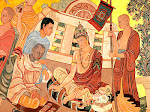Dear Scholars/Friends,
I am submitting my
academic report for the year 2015 as an regular practice every year. This helps
me to evaluate my academic contribution per year and motivate me to do more………..
Papers Published: 05
§ “The
Philosopher King: An Indian Point of View” in Sucharitha: A Journal of
Philosophy and Religion, Volume 03, Issue 01, 2015, pp.12-19. (ISSN: 2319-4235).a
§ “Positive Philosophy, Innovative Method
and Present Education System” in Intellection:
A Bi-annual Interdisciplinary Research Journal, Vol.III, No.II, July-
December 2015, pp.01-13 (ISSN:2319-8192).
§ “Place of
Logic in Indian Philosophy” in Lokāyata:
Journal of Positive Philosophy, Volume V, No. 02 , September, 2015, pp.39-49
(ISSN: 2249-8389).
§ “Positive Philosophy of Swami
Brahmananda Saraswati” in Darshan Jyoti:
Refereed Annual Philosophical Research Journal, Year 05, No.01, September,
2015-August-2016, pp. 124-130 (ISSN: 2249-1196).
§ “Public Service Values and Ethics in
Public Administration” in The Religious-Philosophical
Dimensions edited by Merina Islam, CPPIS, Pehowa in 2015, pp. 109-122
(ISBN: 978-81-922377-5-6).
Papers Presented: 04
·
“Crime against
Dalits and Indigenous Peoples as an International Human Rights Issue” in One-Day
National Seminar on "Human rights for the marginalized groups:
Understanding & Rethinking Strategies" held on February 5, 2015 at
P.G. Govt. College for Girls, Sector-11, Chandigarh.
·
“Dr. B.R.Ambedkar’s
Contribution in the Democratic Rights Struggle” in National Seminar on Dr.
B.R. Ambedkar’s Views on Social Justice, Caste based Discrimination and Dalit
Identity held on March 27-28, 2015 at Dr. Ambedkar Centre of Socio-Economic
Studies for the Weaker Sections of Society and CSSEIP, Panjab University,
Chandigarh.
·
“Philosophy, Creativity
and Human Relations” in 60th Annual Session of All India Philosophy
Association held on 3rd – 5th
June 2015 at School of
Philosophy & Culture, Shri Mata Vaishno Devi University, Katra, Jammu &
Kashmir.
·
“The Role of Religious and Spiritual Values in Shaping Humanity ( A Study
of Dr. B.R. Ambedkar’s Religious Philosophy) in 3rd International Dharma-Dhamma
Conference on Harmony of Religions: Welfare of Humankind, held on 24-26 October, 2015 at
Indore (MP).
Participations:02
o
RUSA Sponsored Seven Days Training
Workshop on “Research
Methodology: Emerging Trends” held on
November 28 to 04 December, 2015 at P.G.Govt. College for Girls, Sector-42,
Chandigarh.
o
Three-Day Philosophy Teachers' Meet of North-Western Zone sponsored by ICPR, New
Delhi, Department of Guru Nanak Studies, Guru Nanak Dev University, Amritsar on
29th to 31st Dec. 2015
Citation
Received: 01
· Dr. Laxmikant
Sharma (2015) “Dr. Ambedkar’s Vision on
Indian Farming” in International Journal of Research in Commerce &
Management, Volume No. 6 (2015), Issue No. 01 (January) (ISSN 0976-2183), p.27.
(Sirswal Desh Raj(2010): Dr. Ambedkar's Views on Humanism and Buddhism" in
Dr. R. B. Langayan(ed.) Relevance of Thoughts of Dr. Ambedkar in Present Times,
Vishal Kaushik Printers, Delhi. ISBN-978-81-89495-41-1.) Link: http://ijrcm.org.in/
download.php? name= ijrcm
-1-IJRCM-1_vol-6_2015_issue-01-art-06.pdf&path=uploaddata/ijrcm-1-IJRCM-1_vol-6_2015_issue-01-art-06.pdf
Online Article: 05
·
69वें भारतीय स्वतन्त्रता दिवस-2015 की
हार्दिक शुभकामनायें
·
भारत रत्न डॉ भीमराव अम्बेडकर जी के जन्मदिवस पर विशेष-2015
·
अंतर्राष्ट्रीय महिला दिवस पर हार्दिक बधाई
·
गांधी बनाम गोडसे बनाम लोकतंत्र
The above short articles
available at:
http://msesaim.wordpress.com/
Programme Organised:03
- ICPR Sponsored
Periodical Lectures at Department of Philosophy in academic collaboration
with Department of Hindi, P.G.Govt. College for Girls, Sector-11,
Chandigarh held on 11-02- 2015.
·
“World
Philosophy Day-2015” at Departments of Philosophy & Hindi, P.G.Govt.
College for Girls, Sector-11, Chandigarh held on 19-11-2015.
·
An
Online National Level Essay Competition for Students on the theme “Dr. B.R.
Ambedkar: The Maker of Modern India” at Centre for Positive Philosophy and
Interdisciplinary Studies (CPPIS), MSES (Regd.), Pehowa (Kurukshetra) held on
19-11-2015 (World Philosophy Day).
Membership: 01
·
Life-Member,
All India Philosophy Association (Akhil Bhartiya Darshan Parishad): 03/06/2015.
Online Pages Developed: 01
· Dr. B.R. Ambedkar:
The Maker of Modern India (Celebrating 125th Birth Anniversary of
Dr. B.R. Ambedkar):
http://drambedkar125.wordpress.com
Posters: 03
·
Happy Teachers’ Day 2015 -The Positive Philosophy
Society
·
Happy Teachers’ Day- CPPIS, Pehowa
·
Word Philosophy Day-2015
Journal
Issues:03
· Lokayata
Vol.IV,No.01 (March 2015) edited by Desh
Raj Sirswal
· Lokayata
Vol.IV,No.02 (Sept 2015) edited by Desh
Raj Sirswal
· Milestone
Education Review Year 06, No. 01 edited by Desh Raj Sirswal
Videos uploaded: 05
· Birth Anniversary
Celebration of Savitribai Phule: Jan 07, 2015
· Academic Programmes (2010-2014) Department of
Philosophy, PGGCG-11, Chd: Jan 08,2015
· Student Activities
(2010-2014) Department of Philosophy, PGGCG-11, Chandigarh: Jan 09,2015
· Sweet Memories of
Milestone Education Society (2006-2011): Jan 14,2015
· Nomination of Prof. Sohan
Raj Tater for “Padam Shri Award”: Jan 17,2015
Videos can be watch at:
Additional Work:
In addition to the
abovesaid, I submitted several reports of the programmes, prepared new online
profiles regular updated all our philosophy pages including Philosophy News in
India, The Positive Philosophy, Indian Psychology, Interdisciplinary Studies,
Scribd.com, Research Gate, Academia.edu, Issuu.com etc. Some assignments are pending for the next
year:
·
Essay in Positive
Philosophy (Book)
·
Dr. B.R.Ambedkar
:The Maker of Modern India (Edited Book)
·
Two issues of
Milestone Education Review will be on Dr. B.R. Ambedkar.
·
Philosophy of Sufism and Islam (Research Paper)
Hope your
blessings, motivation and good wishes guide me in my academic career and social
life in future also.
Thanks for being with me.
Dr.
Desh Raj Sirswal
December 31, 2015





